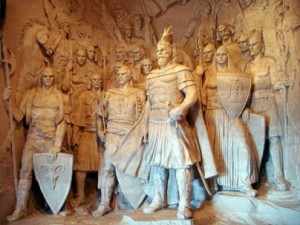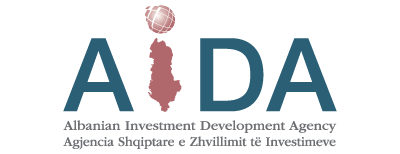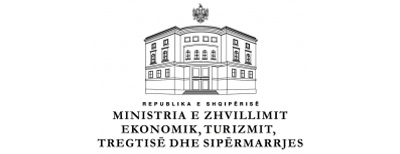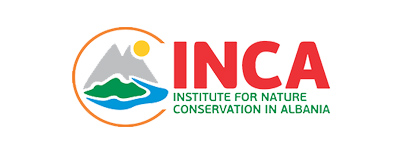History
 The area known as Albania today has been populated since prehistoric times.
The area known as Albania today has been populated since prehistoric times.
In antiquity, much of it was settled by the Illyrians, who are the ancestors of present-day Albanians. It was around the turn of the third millennium B.C. that an Indo-European population settled there. The result of this melding of cultures was the creation of a population incorporating the unique cultural and linguistic characteristics of the whole Balkan Peninsula. Based on this ancient population, the Illyrian people developed through the second millennium and the first century B.C. After its collapse in the year 30 B.C., Illyria came under the control of the Roman Empire. Upon the division of the Roman Empire in 395 A.D., Illyria became a part of the Byzantine Empire. The Greeks arrived in the 5th century B.C. to establish self-governing colonies in Epidamnos (now Durrës), Apollonia, and Butrint, and they established an expansive trading system with the Illyrians, who formed tribal states in the IV century B.C. The expanding Illyrian kingdom clashed with Rome in 229 B.C. A lengthy struggle ensued and resulted in the extension of Roman control over the entire Balkan area by 167 B.C. Under the Romans, Illyrians enjoyed relative peace and prosperity. Large agricultural estates flourished under slave labor. Like the Greeks, the Illyrians managed to preserve their own language and traditions despite centuries of Roman rule. Over time the people gradually replaced their old gods with the new Christian faith championed by Emperor Constantine. Trade continued to flourish during this time. The main route between Rome and Constantinople, the Via Egnatia, passed through the port at Durrës. When the Roman Empire was divided in 395 A.D., Illyria fell within the Eastern Empire, later known as the Byzantine Empire. Three early Byzantine Emperors (Anastasius I, Justin I and Justinian I) were Illyrian in origin. Ongoing invasions by Visigoths, Huns, Ostrogoths, and Slavs continued through the 5th and 6th centuries.
In 1344, Albania was annexed by Serbia. Their control of the area was brief, though, as the Turks defeated the Serbians in 1389. At this point, the Venetians controlled some coastal towns but with the Serbian defeat, the entire region became vulnerable to Ottoman attack. From 1443 to 1468, an Albanian nobleman named Skanderbeg (Gjergj Kastrioti) united warring Albanian princes and led a resistance effort against the Turks from his castle at Kruja. Skanderbeg won all 25 battles he fought against the Turks and kept them at bay for more than two decades. He would go on to become a national hero, but upon his death, the Ottomans overwhelmed Albanian resistance and took control of the country in 1479. For more than 400 years Albania was under Ottoman rule. Muslim citizens were favored and were exempted from the Janissary system, which dictated that Christian households give up one of their sons to convert to Islam and serve in the army. Consequently, many Albanians abandoned their Christian faith and converted to Islam. The subsequent insurrection efforts eventually brought about the proclamation of the independence of Albania in 1912.
King Zog I ruled for nearly fourteen years until the country was invaded by Italy in 1939 and eventually occupied by Mussolini’s forces. German forces occupied portions of Albania during this time, as well. A resistance against this foreign occupation was formed and became known as the Antifascist National Liberation front.
In November of 1944, the occupying forces were eventually expelled and the Communist Party assumed power. Shortly thereafter, a totalitarian regime was established under the communist leader Enver Hoxha. For nearly fifty years, the regime enforced a policy of strict isolationism. This left the country in an extraordinarily impoverished state when it finally emerged from this isolation upon Hoxha’s death in 1991. The Democratic Party assumed control at this point and led the country from 1991 until 1997. 1997 saw a period of great financial and political upheaval as the collapse of vast pyramid schemes threw society into a brief state of chaos. The Socialist Party guided the country through this pivotal time and remained in power until 2005. Following the elections in July 2005, the Democratic Party regained political power and lead Albania until 2013. From 2013 to nowadays, the Socialist Party is governing the country with hope to integrate the country into the European Union (EU). Albania is now a member of the North Atlantic Treaty Organization (NATO) and also part of many other international organizations.
Partners








